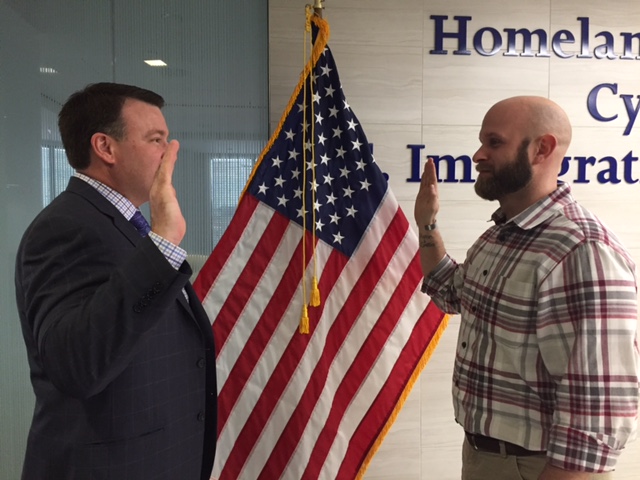HERO grad plays key role in child exploitation investigation
Travis Zabroski had never heard of the Human Exploitation Rescue Operative (HERO) Child Rescue Corps program.
After serving nine years active duty in the U.S. Marines, Zabroski was taking classes and working as a civilian for the Marines when a friend who worked in the cyber realm mentioned the program to him and thought he should check it out to see if it was something of interest.
In April 2013, U.S. Immigration and Customs Enforcement’s (ICE) Homeland Security Investigations (HSI) entered into a partnership with the U.S. Special Operations Command and the National Association to Protect Children (PROTECT) to launch the HERO program. It was created to provide wounded, injured and ill Special Operations Forces an opportunity to receive training in high-tech computer forensics and law enforcement skills, to assist federal agents in the fight against online child sexual exploitation.
Zabroski, who was medically discharged from the Marines after sustaining injuries in combat, began training as a HERO intern in January 2016.
A year later, on Feb. 7, 2017, after completing his training and internship as a HERO, Zabroski was sworn in as a full-time computer forensic analyst with HSI’s Child Exploitation Investigations Unit (CEIU).
“I wasn’t even a computer guy, but the HERO program was able to take someone like myself, an infantry guy in the Marine Corps, and really break down everything simple so that I could understand and retain it,” Zabroski said. “It was a very beneficial program and being able to transition from the internship to a full-time employee was definitely a great stepping stone to being here at victim identification.”
On the same day he was sworn in, Zabroski played an instrumental role in the identification and rescue of three young child victims of sexual abuse. CEIU’s Victim Identification Program had recently received information from the National Center for Missing and Exploited Children regarding a series of child exploitation images. Over the course of the next few weeks after thoroughly analyzing the images, Zabroski passed along the information to the HSI office in the area where the suspect was located. It led to the arrest of the subject and rescue of the victims.
“It was one of those ‘hell yeah’ moments,” Zabroski said. “It definitely shows the team effort of what this is and how it comes together.”
The HERO program has made it possible for military veterans like Zabroski to continue to serve their country at home by identifying and rescuing child victims of sexual abuse and online sexual exploitation. Its success has shown a veteran’s disability doesn’t signal the end.
As Zabroski found, it can be just the beginning of a new opportunity.
“I’d tell anyone who’s interested to definitely take a look at the program,” Zabroski said. “It is something that’s been very rewarding.”


